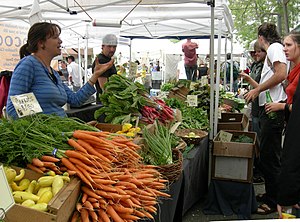|
Economics is the social science that analyzes the production, distribution, and consumption of goods and services. The term economics comes from the Ancient Greek οἰκονομία (oikonomia, "management of a household, administration") from οἶκος (oikos, "house") + νόμος (nomos, "custom" or "law"), hence "rules of the house(hold)". Current economic models emerged from the broader field of political economy in the late 19th century. A primary stimulus for the development of modern economics was the desire to use an empirical approach more akin to the physical sciences. Economics aims to explain how economies work and how economic agents interact. Economic analysis is applied throughout society, in business, finance and government, but also in crime, education, the family, health, law, politics, religion, social institutions, war, and science. The expanding domain of economics in the social sciences has been described as economic imperialism. Common distinctions are drawn between various dimensions of economics. The primary textbook distinction is between microeconomics, which examines the behavior of basic elements in the economy, including individual markets and agents (such as consumers and firms, buyers and sellers), and macroeconomics, which addresses issues affecting an entire economy, including unemployment, inflation, economic growth, and monetary and fiscal policy. Other distinctions include: between positive economics (describing "what is") and normative economics (advocating "what ought to be"); between economic theory and applied economics; between mainstream economics (more "orthodox" dealing with the "rationality-individualism-equilibrium nexus") and heterodox economics (more "radical" dealing with the "institutions-history-social structure nexus"); and between rational and behavioral economics. Microeconomics, like macroeconomics, is a fundamental method for analyzing the economy as a system. It treats households and firms interacting through individual markets as irreducible elements of the economy, given scarcity and government regulation. A market might be for a product, say fresh corn, or the services of a factor of production, say bricklaying. The theory considers aggregates of quantity demanded by buyers and quantity supplied by sellers at each possible price per unit. It weaves these together to describe how the market may reach equilibrium as to price and quantity or respond to market changes over time. Such analysis includes the theory of supply and demand. It also examines market structures, such as perfect competition and monopoly for implications as to behavior and economic efficiency. Analysis of change in a single market often proceeds from the simplifying assumption that relations in other markets remain unchanged, that is, partial-equilibrium analysis. General-equilibrium theory allows for changes in different markets and aggregates across all markets, including their movements and interactions toward equilibrium. 
Economists study trade, production and consumption decisions, such as those that occur in a traditional marketplace.
Main article: History of economic thought Economic writings date from earlier Mesopotamian, Greek, Roman, Indian, Chinese, Persian, and Arab civilizations. Notable writers from antiquity through to the 14th century include Aristotle, Xenophon, Chanakya (also known as Kautilya), Qin Shi Huang, Thomas Aquinas, and Ibn Khaldun. The works of Aristotle had a profound influence on Aquinas, who in turn influenced the late scholastics of the 14th to 17th centuries. Joseph Schumpeter described the latter as "coming nearer than any other group to being the ’founders’ of scientific economics" as to monetary, interest, and value theory within a natural-law perspective. 
1638 painting of a French seaport during the heyday of mercantilism Two groups, later called ’mercantilists’ and ’physiocrats’, more directly influenced the subsequent development of the subject. Both groups were associated with the rise of economic nationalism and modern capitalism in Europe. Mercantilism was an economic doctrine that flourished from the 16th to 18th century in a prolific pamphlet literature, whether of merchants or statesmen. It held that a nation’s wealth depended on its accumulation of gold and silver. Nations without access to mines could obtain gold and silver from trade only by selling goods abroad and restricting imports other than of gold and silver. The doctrine called for importing cheap raw materials to be used in manufacturing goods, which could be exported, and for state regulation to impose protective tariffs on foreign manufactured goods and prohibit manufacturing in the colonies. Physiocrats, a group of 18th century French thinkers and writers, developed the idea of the economy as a circular flow of income and output. Physiocrats believed that only agricultural production generated a clear surplus over cost, so that agriculture was the basis of all wealth. Thus, they opposed the mercantilist policy of promoting manufacturing and trade at the expense of agriculture, including import tariffs. Physiocrats advocated replacing administratively costly tax collections with a single tax on income of land owners. In reaction against copious mercantilist trade regulations, the physiocrats advocated a policy of laissez-faire, which called for minimal government intervention in the economy. Modern economic analysis is customarily said to have begun with Adam Smith (1723–1790). Smith was harshly critical of the mercantilists but described the physiocratic system "with all its imperfections" as "perhaps the purest approximation to the truth that has yet been published" on the subject.
From Wikipedia, the free encyclopedia : Other service activities in the field of information |



